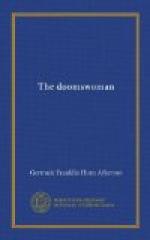“Never have they been so beautiful, Eustaquia! Is it not so, my Prudencia?” she cried to the girl, who was curled on one corner of the table, gloating over the treasures she knew her uncle’s generosity would make her own. “Look, how these little diamonds flash! And the embroidery on this crepe!—a dozen eyes went out ay! yi! This satin is like a tile! These fans were made in Spain! This is as big as a windmill. God of my soul!”—she threw a handful of yellow sewing-silk upon a piece of white satin; “Ana shall embroider this gown,—the golden poppies of California on a bank of mountain snow.” She suddenly seized a case of topaz and a piece of scarlet silk and ran over to me: I being a Monterena, etiquette forbade me to purchase in Santa Barbara. “Thou must have these, my Eustaquia. They will become thee well. And wouldst thou like any of my white things? Mary! but I am selfish. Take what thou wilt, my friend.”
To refuse would be to spoil her pleasure and insult her hospitality: so I accepted the topaz—of which I had six sets already—and the silk,—whose color prevailed in my wardrobe,—and told her that I detested white, which did not suit my weather-dark skin, and she was as blind and as pleased as a child.
“But come, come,” she cried. “My father is not so generous when he has to wait too long.”
She gathered the mass of stuff in her arms and staggered up the companion-way. I followed, leaving Prudencia raking the trove her short arms would not hold.
“Ay, my Chonita!” she wailed, “I cannot carry that big piece of pink satin and that vase. And I have only two pairs of slippers and one fan. Ay, Cho-n-i-i-ta, look at those shawls! Mother of God, suppose Valencia Menendez comes—”
“Do not weep on the silk and spoil what thou hast,” called down Chonita from the top step. “Thou shalt have all thou canst wear for a year.”
She reached the deck and stood panting and imperious before her father. “All! All! I must have all!” she cried. “Never have they been so fine, so rich.”
“Holy Mary!” shrieked Don Guillermo. “Dost thou think I am made of doubloons, that thou wouldst buy a whole ship’s cargo? Thou shalt have a quarter; no more,—not a yard!”
“I will have all!” And the stately daughter of the Iturbi y Moncadas stamped her little foot upon the deck.
“A third,—not a yard more. And diamonds! Holy Heaven! There is not gold enough in the Californias to feed the extravagance of the Senorita Dona Chonita Iturbi y Moncada.”
She managed to bend her body in spite of her burden, her eyes flashing saucily above the mass of tulle which covered the rest of her face.
“And not fine raiment enough in the world to accord with the state of the only daughter of the Senor Don Guillermo Iturbi y Moncada, the delight and the pride of his old age. Wilt thou send these things to the North, to be worn by an Estenega? Thy Chonita will cry her eyes so red that she will be known as the ugly witch of Santa Barbara, and Casa Grande will be like a tomb.”




